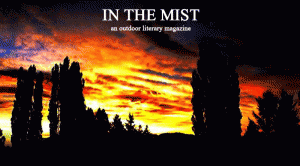 Editor Ange Tysdal founded In the Mist to give a voice to all the other female adventurers who need a home for their work. “In the Mist is seeking submissions for our maiden issue from women who play, or write about playing, in the mist. Send us your poetry, fiction, nonfiction, photography, and artwork about being outside. We’re interested in anything from doing yoga in the park to walking your dog to bombing down the Anasazi Descent in Durango, Colorado or sailing from California to Hawaii in a kayak with outriggers.” Deadline: Aug. 31, 2008.
Editor Ange Tysdal founded In the Mist to give a voice to all the other female adventurers who need a home for their work. “In the Mist is seeking submissions for our maiden issue from women who play, or write about playing, in the mist. Send us your poetry, fiction, nonfiction, photography, and artwork about being outside. We’re interested in anything from doing yoga in the park to walking your dog to bombing down the Anasazi Descent in Durango, Colorado or sailing from California to Hawaii in a kayak with outriggers.” Deadline: Aug. 31, 2008.
New Online Lit Mag :: Salt Magazine
 “Salt Magazine began life in Australia in 1990 under the editorship of John Kinsella, it rapidly developed an reputation as an exciting venue for a wide range of writers and writing practices: international, diverse and pluralistic. The magazine has had a number of guest editors, has partnered with both Jacket Magazine and Verse Magazine, and has published poems, short stories, biography, literary criticism, cultural criticism, essays and reviews. The bi-annual issues have been thematic but have rarely included editorials.”
“Salt Magazine began life in Australia in 1990 under the editorship of John Kinsella, it rapidly developed an reputation as an exciting venue for a wide range of writers and writing practices: international, diverse and pluralistic. The magazine has had a number of guest editors, has partnered with both Jacket Magazine and Verse Magazine, and has published poems, short stories, biography, literary criticism, cultural criticism, essays and reviews. The bi-annual issues have been thematic but have rarely included editorials.”
A Sorta Father’s Day Poem by David Fraser
Here’s one from Killing Trout and Other Love Poems that I thought of on this Father’s Day. It’s fun to hear Dave read this one himself, at the end of it, he gives an incredulous, “Mom!”
My Father’s Old Camera Said…
the old camera said,
when I picked it up,
said something about
3 dozen grey sunsets,
before that, a factory
in Germany, it had
traveled, sat around
the shop, been opened
and closed like the mouth
of a horse, traded
on an impulse,
caught me, young,
leaning against the crescent moon
next to the wishing
well on Belle Isle,
caught my uncle catching
trout, my brother diapered
and crying in my old crib.
and before that, had seen my mother
nearly naked, smiling at it,
adjusting her fake fur stole.
Rawi Hage Wins International Impac Dublin Literary Award
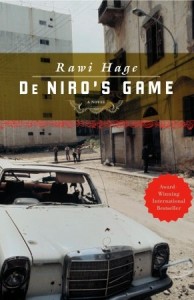 Author Rawi Hage, born in Beirut, Lebanon and currently living in Montreal, Canada, has been awarded the International Impac Dublin Literary Award for his first novel De Niros Game (2007, Steerforth Press). His work was selected over seven other authors and has received a prize of 100,000 euros. The International Impac Dublin Literary Award is the considered the world’s most lucrative prize in the field of literature.
Author Rawi Hage, born in Beirut, Lebanon and currently living in Montreal, Canada, has been awarded the International Impac Dublin Literary Award for his first novel De Niros Game (2007, Steerforth Press). His work was selected over seven other authors and has received a prize of 100,000 euros. The International Impac Dublin Literary Award is the considered the world’s most lucrative prize in the field of literature.
Hages’s book, De Niro’s Game, revolves around two childhood friends growing up in war-torn Beirut who must choose between self-imposed exile or a life of crime at home. The book is described by the publisher as being “Told in a distinctive, captivating voice that fuses vivid cinematic imagery and page-turning plot with the measured strength and beauty of Arabic poetry, De Niro’s Game is an explosive portrait of life in a war zone, and a powerful meditation on what comes after.”
Hage, who lived through nine years of civil war in Beirut before emigrating to Canada said, “After a long journey of war, displacement and separation, I feel that I am one of the few wanderers who is privileged enough to have been rewarded, and for that I am very grateful.”
Hage was chosen from 137 novelists nominated by 162 public libraries in 45 countries across the globe. Other finalists for this year’s competition, this year’s list of judges and previous winners can be found on the Impac Dublin website.
Father’s Day by Bruce Guernsey
Father’s Day
Poetry and Essay by Bruce Guernsey
Wild River Review, June 2008
For the buried, closure.
For the missing, space–
This Illinois distance
Where a man can walk forever,
Stubble and sky,
Where a house on the other side
Is ever the horizon.
Ten years ago this month—June, the month of Father’s Day—what was thought to be the remains of my father’s body were found in some woods along a ridge by a couple of hikers. He had disappeared three years before from a VA hospital in rural Pennsylvania. His Parkinson’s Disease had finally exhausted my mother, and she couldn’t keep him at home anymore. On most days, he was helpless, but every once in a while, he could with a struggle dress himself. Gaining momentum, he’d then shuffle about, gathering speed as he went, head-down and charging like the soldier he once was into enemy fire—that is, into whatever was in the way, be it a lamp or a shelf full of crystal, and down they’d come. And if a door were open, out he’d go, which is exactly what he did that day at the VA…[read the rest on Wild River Review]
Tupelo Press Submissions – July & Year-Round
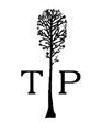 While only accepting open submissions for poetry manuscripts during the month of July, Tupelo Press will now read submissions of fiction (including novels and short story collections) and creative nonfiction year-round. All submissions require a reading fee.
While only accepting open submissions for poetry manuscripts during the month of July, Tupelo Press will now read submissions of fiction (including novels and short story collections) and creative nonfiction year-round. All submissions require a reading fee.
Job :: Editorial Position at Hyperion
Posted on WestConn MFA in Professional Writing , June 11, 2008:
“Hyperion has a terrific entry level opening, working as assistant to an executive editor (Brenda Copeland) and the associate publisher (Kristin Kiser). It’s a fine opportunity that would give the right person some real big-picture experience. A brief job description below. If you want to apply, please send an email to Brenda, with resume attached. Please feel free to forward this email. Brenda Copeland Executive Editor HYPERION 77 W. 66th Street – 11th Floor New York, NY 10023 P: 212.456-0143 [email protected]”
Job Description The editorial assistant provides editorial and administrative support to one Executive Editor and one VP/Associate Publisher. It is the responsibility of the assistant to ensure that the editor’s and AP’s offices are well-maintained, specifically: answer telephones, keep accurate files, and maintain calendars. For the editor, the assistant will also do the following: record submissions and rejections, draft rejection letters, make sure that author checks are requisitioned in accordance with contractual obligations, and make sure that fact sheets and other materials are submitted on time. For the editor, the assistant will also track book projects from the manuscript stage through to the arrival of the finished books and deal with post-production matters. He or she must look out for potential problems, keep an eye on deadlines, and keep editors, authors, and agents informed about production schedules and other significant deadlines. In addition the assistant will be called upon to read and evaluate manuscript submissions and draft promotional material such as flap copy, catalog copy, and audio copy. For the Associate Publisher, the assistant will keep lists for several seasons and update accordingly, schedule campaign meetings and assist with follow up with various departments (editorial, publicity, marketing, and sales), schedule sales meetings and assist with follow up.
Bob Dylan, Bathtubs, Poetry and Harold Bloom
 Here’s a fun interview from Eurozine that goes off into some interesting directions, including discussing poetry writing and Harold Bloom (the comments on him even made me laugh a bit).
Here’s a fun interview from Eurozine that goes off into some interesting directions, including discussing poetry writing and Harold Bloom (the comments on him even made me laugh a bit).
Ieva Lesinska, Christopher Ricks
A lesson in Dylan appreciation
April 11, 2008
Christopher Ricks, professor of humanities at Boston University and professor of poetry at Oxford University, is famous for his close readings of Milton, Keats, and Eliot, and also for his passion for the music of Bob Dylan. This culminated in his book Dylan’s Visions of Sin (2003), an analysis of Dylan’s lyrics that had some critics grumble that Ricks could talk one into believing that even a phone book is poetry. Ieva Lesinska, editor of Rigas Laiks, decided to find out for herself.
Ieva Lesinska: Professor Ricks, why do you have a bathtub in your office?
Christopher Ricks: It’s Bob Dylan’s childhood bathtub. It’s where the young Dylan made his first splash. It belongs to two former Boston University alumni. They saw it on e-bay and wondered whether to buy it; I urged them to do so.
IL: One of the things I’d really like to understand is why it is that I fail to appreciate Bob Dylan?
CR: And what does your psychoanalyst say about this problem?
IL: I don’t have one. I mean, I don’t have a psychoanalyst.
CR: I know what you mean: there’s an immense lot of art out in the world that people I care about praise highly that means nothing to me. I’ve been to museums that are full of plates, but I’ve never seen a plate that would make any difference to my life. I’ve never seen a Braque painting that would mean anything to me. But I can’t ignore Picasso or Daumier. On the other hand, you could ask: “I love Leonard Cohen, so how come I don’t love Bob Dylan?”
IL: But I don’t love Leonard Cohen, I find him somewhat tedious.
CR: Well, good. That’s the right answer, as you surely know.
IL: When I read Dylan’s lyrics, I know that I should like him, because the lyrics work for me. But when I hear the voice, first of all I can’t hear the lyrics anymore, there’s just that nasal tone that I don’t much care for. But I’ve really tried.
CR: And why should you like him?
Read the rest on Eurozine.
SciFi v. Literature – Why?
Science Fiction, literature, and the haters
by Jake Seliger
Posted June 5, 2008 on The Story’s Story
Seliger’s essay begins with this question: “Why does so little science fiction rise to the standards of literary fiction?”
And explores this both from the perspective of a reader AND writer of SciFi. His experiences with rejection of his novel add to the mix of how SciFi is treated, and he comes part way through the essay to this commentary:
“It’s unfortunate that the entire genre gets tarred as junk by some critics and readers when in reality it’s not entirely junk—if it were, I wouldn’t write a long essay describing it. I have a theory as to why science fiction often gets labeled as junk: it values other qualities than aesthetic novelty/skill and deep characterization. It’s more concerned with ideas rather than how ideas are expressed, while the greatest literary fiction sees ideas and their expression as inextricably linked. At the same time, though, I think that science fiction’s defenders might bring on the literary snobs’ ire by doing things like calling them literary snobs when many aren’t actually snobs, but just have standards that science fiction too infrequently reaches in part for the reason I just stated. This is also why, I suspect, science fiction has trouble achieving the critical and academic recognition it should probably have, especially given its larger impact on the culture. I’m one of the defenders of good writing being good writing regardless of where it comes from, but the more science fiction I read, the more I realize so much of it just doesn’t have the skill in narrative, detail, character, sympathy and complexity, language, and dialog that readers of literary fiction demand. I still like a lot of science fiction, but most of it now causes me to roll my eyes and skip pages: characters have no life, the books have no lifeness, clichés abound, and strong setups devolve into variations on cowboys and indians.”
There is more, much more, to this thoughtful and well supported exploration, in which Seliger himself says he comes to no final conclusion. All the more for the readers and writers to consider.
New Online Lit Mag :: Pulse
Pulse: Voices from the Heart of Medicine. This new magazine is dedicated to publishing personal accounts of illness, fostering the humanistic practice of medicine, and encouraging health care advocacy. Patients and health professionals are invited to sign up as a friend to the magazine to receive the issues and/or to submit original creative work.
New Online Issues Posted June 11
Stop by NewPages Magazine Stand to find publisher descriptions for new online issus from our sponsor magazines, and a list of new issues of other online literary magazines. If you’d like to be listed on this page, all you need to do is send me notice of your new issues online: denisehill-at-newpages.com. I’d certainly like to see more listings here to keep this feature going.
New Lit on the Block :: Canarium Journal
 Canarium is the occasional journal of Canarium Books. The first issue, Canarium 1, was published in early 2008 at the University of Michigan, and is sponsored by the Institute for the Humanities, the International Institute, Arts on Earth, the MFA in Creative Writing Program, and Rackham Graduate School. Two of Canarium’s editors, Joshua Edwards and Nick Twemlow have co-edited an independent occasional journal, The Canary, with Anthony Robinson since 2002.
Canarium is the occasional journal of Canarium Books. The first issue, Canarium 1, was published in early 2008 at the University of Michigan, and is sponsored by the Institute for the Humanities, the International Institute, Arts on Earth, the MFA in Creative Writing Program, and Rackham Graduate School. Two of Canarium’s editors, Joshua Edwards and Nick Twemlow have co-edited an independent occasional journal, The Canary, with Anthony Robinson since 2002.
Issue 1 includes: Arda Collins, Takashi Hiraide, Sawako Nakayasu, Ed Roberson, Alan Gilbert, Suzanne Doppelt, Cole Swensen, Jibade-Khalil Huffman, Suzanne Buffam, Betsy Andrews, Erica Bernheim, Wayne Koestenbaum, Andy Carter, Eula Biss, Srikanth Reddy, Philip Jenks, Simone Muench, Dunya Mikhail.
“We are dedicated to publishing poetry by established and emerging authors from the United States and abroad.”
New Lit on the Block :: First City Review
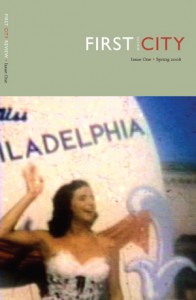 First City Review is “a quarterly journal of pop culture, fiction, essay, poetry, travel, and review that covers the contemporary and idiosyncratic experience of life in Philadelphia and the world beyond.”
First City Review is “a quarterly journal of pop culture, fiction, essay, poetry, travel, and review that covers the contemporary and idiosyncratic experience of life in Philadelphia and the world beyond.”
Issue 1 features new fiction from Thaddeus Rutkowski, Paula Bomer, Johannah Rodgers, Brooke Comer, Leslie Bienen, Alexa Beattie and Chad Willenborg. Poetry from John Grey, Bryon D. Howell, Youssef Rakha and James R. Whitley. Essay by James Wagner. And featuring new photography work from Heather Weston, found photos, and sketches and pencil drawings.
FCR accepts submissions year-round in fiction, essay, poetry, criticism, review and travel.
Backwards City Throws in the Towel – Permanently?
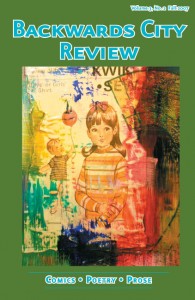 It seems a bit odd, but shortly after posting an “Original Editor’s Farewell” on the site, which spoke of the new blood taking over teh publicaiton, this was posted on the Backwards City Review Blog, Thursday, March 20, 2008:
It seems a bit odd, but shortly after posting an “Original Editor’s Farewell” on the site, which spoke of the new blood taking over teh publicaiton, this was posted on the Backwards City Review Blog, Thursday, March 20, 2008:
“And With That…
And with that, I have some sad news. Backwards City Review is suspending operation as of its 7th issue, which is now back from the printer and being mailed out shortly. There’ll be more details forthcoming, but for now let me say, on behalf of all the editors, past, past, and future, it’s been a lot of fun, and thanks.”
I dropped BCR an e-mail to ask if this was permanent or not, as so often there is “hiatus” status while publications re-organize themselves, but I have not heard back from them. Sadly, in that founding editor’s farewell was the following comment:
“Yes, the founders of the BCR are stepping down. Our city is ripe for regime change. Citizens with pitchforks. Rhythmic chants. But we have not thrown the baby out with the bathwater. This little toddler will continue, there’s a new mayor in town, and remember, it takes a village. Another squad of hungry editors, right at this very moment, is waiting to get their hands on the next batch of oddities that you so crave. The magazine is in excellent hands. Our neighborhood, our city, our backwards nation is strong. It will prosper, thrive, probably get better, as hard as that is to imagine. And if it doesn’t, we’ll bash the kneecaps of each of those youngbloods.”
I don’t think I want to know if any knees were bashed, but I would hope there is some truth to the strength that can prosper and thrive, and that we might not yet have seen the last of BCR. If not, then perhaps the message is one much more prophetically overarching – as one lit mag fades away, I sit here with three inaugural issues of the new lit mag ventures, the next generation of hope and high energy. It is the way of our world.
Award :: Tupelo Press 2008 Snowbound Chapbook
Winner of the Tupelo Press 2008 Snowbound Chapbook Award
Judge Dana Levin has selected Stacey Waite of Pittsburgh, PA as winner of the 2008 Snowbound Series Chapbook Award. Her manuscript, titled “the lake has no saint,” will be published by Tupelo Press in 2010.
The runners up are:
Jamie O’Halloran of Los Angeles, CA for “The Visible Woman”
John Surowiecki of Amston, CT for “Mr. Niedzwiedzki’s Pink House”
Deb Casey of Eugene, OR for “Spit & Purr”
Other Finalists:
Lisa Beskin – Belchertown, MA, “Shadow Globe”
Remica Bingham – Norfolk, VA, “The Body Speaks”
John de Stefano – New York, NY, “From: Critical Opalescence and the Blueness of the Sky”
Mary Helen Molinary – Memphis, TN, “The Book of 8:38”
Howard Robertson – Eugene, OR, “Three Odes to Gaia”
Robin Beth Schaer – New York, NY, “Almost Tiger”
Suzume Shi – New London, CT, “Ao”
Jacob Shores-Arguello – Fayetteville, AR, “John Barleycorn Must Die”
Janet Sylvester – Kittery, Maine, “The Unbinding”
Semifinalists:
Hadara Bar-Nadav – Kansas City, MO, “Fable of Flesh”
Colin Cheney – Brooklyn, NY, “Here There Be Monsters”
Mark Conway – Avon, MN, “Dreaming Man, Face Down”
John de Stefano – New York, NY, “From: Three-Body Problems”
Joanne Diaz – Chicago, IL, “Violin”
Jennifer Kwon Dobbs – New York, NY, “Mongrel Angels”
Matthew Hittinger – Astoria, NY, “Spectacular Reflection”
Christina Hutchins – Albany, CA, “Dark Creek”
M. Smith Janson – Florence, MA, “Letter Written in this Life, Mailed from the Next”
Jesse Lee Kercheval – Madison, WI, “My Life as a Silent Movie”
Sandra Kohler – Dorchester, MA, “Final Summer”
Gary Copeland Lilley – Swannanoa, NC, “Wade In Da Wahtuh”
Matthew Lippman – Claverack, NY, “Moses”
Mike Maniquiz – Clovis, CA, “Cooking Frutti Di Mare on This Early Evening Before the
Night Falls on Kentucky Hillsides”
Mary Helen Molinary – Memphis, TN, “This Book of Sun”
Rusty Morrison – Richmond, CA, “Insolence”
Teresa Pfeifer – Chicopee, MA, “Little Matryoshka”
Joseph Radke – Milwaukee, WI, “A Source of Reasons”
Boyer Rickel – Tucson, AZ, “reliquary”
Reginald Shepherd – Pensacola, FL, “Photos of the Fallen World: Poems”
Page Hill Starzinger – New York, NY, “Black Tongue”
Barry Sternlieb – Richmond, MA, “Winter Crows”
Jonathan Weinert – Concord, MA, “Charged Particles”
Jobs :: Various
The MFA Program of Warren Wilson College seeks a full-time resident Director, effective June 1, 2009.
The Department of English at Medgar Evers College invites applications for a full-time tenure-track position teaching Creative and Professional Writing. July 1.
Williams Collge Writing Coordinator, Academic Resource Center. The College is pleased to announce an opening for a full-time Writing Coordinator reporting to the Director of Academic Resources under the auspices of the office of the Dean of the College. Immediate.
Advice to Poets from Copper Canyon
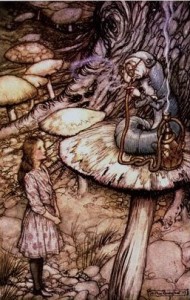 Copper Canyon Press offers an “Advice to Poets” page on their website in response to writers seeking the advice of this publishing guru. The page links to several articles, including: “Becoming a Poet: One Step at a Time” by John Haines; “Advice to Young Poets: How to Make It out of the Slush Pile of Submissions” and “The Don’t and Dos of Cover Letters” by editor Eleanor Hamilton; and “Thirty-two Statements About Writing Poetry” by Marvin Bell. Take it from the pros. It’s free.
Copper Canyon Press offers an “Advice to Poets” page on their website in response to writers seeking the advice of this publishing guru. The page links to several articles, including: “Becoming a Poet: One Step at a Time” by John Haines; “Advice to Young Poets: How to Make It out of the Slush Pile of Submissions” and “The Don’t and Dos of Cover Letters” by editor Eleanor Hamilton; and “Thirty-two Statements About Writing Poetry” by Marvin Bell. Take it from the pros. It’s free.
Documentary Film :: Including Samuel
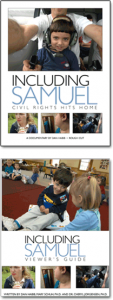 “Photojournalist Dan Habib rarely thought about inclusion before he had his son Samuel seven years ago. Now he thinks about inclusion every day. Habib’s documentary film Including Samuel examines the educational and social inclusion of youth with disabilities as a civil rights issue.
“Photojournalist Dan Habib rarely thought about inclusion before he had his son Samuel seven years ago. Now he thinks about inclusion every day. Habib’s documentary film Including Samuel examines the educational and social inclusion of youth with disabilities as a civil rights issue.
“Including Samuel is built on the efforts of Dan Habib and his family to include Samuel, 7, in all facets of school and community. Including Samuel also features four other families with varied inclusion experiences, plus interviews with dozens of teachers, young people, parents and disability rights experts.”
NYQ Poetry Database
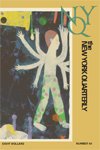 The New York Quarterly has added a unique new feature to their website:NYQ Poets, a searchable database of poets and poems that have appeared in issues of NYQ. Poets whose works have appeared can add their own information to their page, including: photo, announcements, biography, links, audio, video, books and more.
The New York Quarterly has added a unique new feature to their website:NYQ Poets, a searchable database of poets and poems that have appeared in issues of NYQ. Poets whose works have appeared can add their own information to their page, including: photo, announcements, biography, links, audio, video, books and more.
Readers can search poets and poems by name, or browse the full database by leaving search fields blank or entering only a letter (although, avoid the “back” button on your browser – some glitch takes you back to an error page). NYQ links the poem to an order page for the issue in which the work appears. Limited “classic” back issues can be ordered, or digital reprints through Amazon, Barnes and Noble, or Powell’s Books.
Shambhala Sun Talks to Leonard Cohen
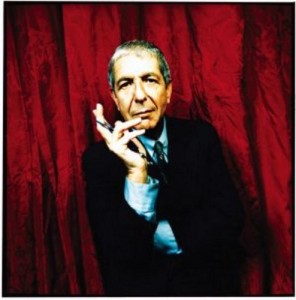 He Has Tried in His Way to Be Free
He Has Tried in His Way to Be Free
By Sarah Hampson
Sambhala Sun
November 2007
And to a remarkable extent, Leonard Cohen is succeeding. Sarah Hampson had a rare opportunity to spend an afternoon with the famed singer and poet. He’s got the wisdom of age but he’s still the essence of cool—the perfect reflection of his years of Zen.
[. . .] It is often said that Cohen is hard to define. There’s Cohen, the son of a prominent Montreal clothier and the grandson of a Jewish scholar. Cohen, the law-school dropout. Cohen, the novelist, the poet, the songwriter. Cohen, the sexual bad boy who becomes a monk.
But he disagrees. “I always felt it was of one piece. I never felt I was going off on a tangent. Mainly because I think we develop images of ourselves quite early on, and certainly one of the images I had of myself came from reading Chinese poetry at a very young age. There was a kind of solitary figure in some of those poems by Li Po and Tu Fu. A monk sitting by a stream. There was a notion of solitude, a notion of deep appreciation for personal relationships, friendships, not just love, not just sensual or erotic or the love of a man or a woman, but a deep longing to experience and to describe friendship and loss and the consequences of distance. So those images in those poems had their effect, and thirty years later, I found myself in robes and a shaved head sitting in a meditation hall. It just seemed completely natural,” he says in a quiet manner [. . .]
Read the rest on Shambhala Sun.
Iowa Review Human Rights Indexes
Human Rights Index
The Human Rights Index, a continuing series, is prepared by the UI Center for Human Rights (UICHR) for publication in The Iowa Review three times annually.
First published in the Fall 2001 issue of the The Iowa Review, it is intended to suggest the global political/socio-economic context within which we read and write, reflecting a shared belief that human rights cannot be truly advanced without the virtues of the intuitive as well as the cognitive that are in each of us.
Each of the indexes provides a number followed by a description of the real life, human situation the number represents. For example, from the 2007-08 Winter issue, index on Indigenous Peoples:
4
Number of states (Canada, Australia, New Zealand, United States), each with sizable indigenous populations, that refused to sign the UN Declaration on the Rights of Indigenous Peoples, endorsed by 143 other nations on 13 September 2007, even though the Declaration is technically non-binding (AFP 2007; OHCHR 2007)
The following are provided full-text on the UICHR site:
Winter 2007-08: Indigenous Peoples (#20)
Fall 2007: Global Climate Change (#19)
Spring 2007: Immigration (#18)
Winter 2006-07: Women and Armed Conflict (#17)
Fall 2006: HIV/AIDS in Africa (#16)
Spring 2006: Human Trafficking (#15)
Winter 2005-06: Water (#14)
Fall 2005: Disaster Relief (#13)
Spring 2005: Darfur (#12)
Winter 2004-05: The Iraq War (#11)
Fall 2004: Health Care (#10)
Spring 2004: Hunger (#9)
Winter 2003-04: Genocide (#8)
Fall 2003: Israeli-Palestinian Conflict (#7)
Spring 2003: The United States (#6)
Winter 2002-03: Refugees, Asylum Seekers and Internally Displaced Persons (#5)
Fall 2002: 9/11 and the “War on Terror” (#4)
Spring 2002: Women (#3)
Winter 2001-02: Child Labor (#2)
Fall 2001: Three Generations of Human Rights (#1)
New Lit on the Block :: First City Review
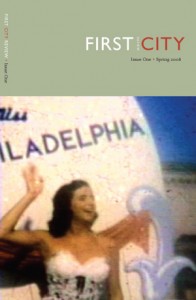 “First City Review is a quarterly journal of pop culture, fiction, essay, poetry, travel, and review that covers the contemporary and idiosyncratic experience of life in Philadelphia and the world beyond. We accept submissions year-round in fiction, essay, poetry, criticism, review and travel. All work must be accompanied by an SASE and cover letters are encouraged.”
“First City Review is a quarterly journal of pop culture, fiction, essay, poetry, travel, and review that covers the contemporary and idiosyncratic experience of life in Philadelphia and the world beyond. We accept submissions year-round in fiction, essay, poetry, criticism, review and travel. All work must be accompanied by an SASE and cover letters are encouraged.”
Issue 1 features new fiction from Thaddeus Rutkowski, Paula Bomer, Johannah Rodgers, Brooke Comer, Leslie Bienen, Alexa Beattie and Chad Willenborg. Poetry from John Grey, Bryon D. Howell, Youssef Rakha and James R. Whitley. Essay by James Wagner. And featuring new photography work from Heather Weston, found photos, and sketches and pencil drawings from some of our friends.
New Lit on the Block :: The Farallon Review
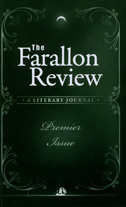 “The Farallon Review is a new literary review featuring contemporary, engaging, and literary prose fiction with a modern view, a classic sensibility, and a west-coast flavor. The Premier Issue contains stories by Jamey Genna, Abeer Hoque, Ken Rodgers, Lynka Adams, and S.J. Sasken.Read about river rafting in the Rocky Mountains, weddings in India, soldiers seeking comfort, families struggling with their past, pigeons mirroring the emotional wasteland around them. We are currently reviewing submissions for our second issue.”
“The Farallon Review is a new literary review featuring contemporary, engaging, and literary prose fiction with a modern view, a classic sensibility, and a west-coast flavor. The Premier Issue contains stories by Jamey Genna, Abeer Hoque, Ken Rodgers, Lynka Adams, and S.J. Sasken.Read about river rafting in the Rocky Mountains, weddings in India, soldiers seeking comfort, families struggling with their past, pigeons mirroring the emotional wasteland around them. We are currently reviewing submissions for our second issue.”
Crazyhorse Prize Winners Announced
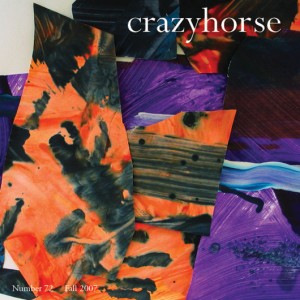 The editors of Crazyhorse are pleased to announce the 2008 Crazyhorse Prize Winners (prize entry deadline of Dec. 20, 2007).
The editors of Crazyhorse are pleased to announce the 2008 Crazyhorse Prize Winners (prize entry deadline of Dec. 20, 2007).
Crazyhorse Fiction Prize
Judged by Ha Jin
Fiction Winner: Miranda Beverly-Whittemore
for the story “Pertussis”
Fiction finalists: Roy Kesey, Marjorie Celona, Cathryn Alpert, Rachel Cassandra, Devon Code.
Lynda Hull Memorial Poetry Prize
Judged by Billy Collins
Poetry Winner: Jeff Walker
for the poem “Itchy Is As Scratchy Does”
Poetry finalists: Alexis Orgera, Jordan Windholz, Claire Millikin, Michael Robins, J. Mae Barizo, Elizabeth Marzoni, Xu Smith, Christopher Howell, Juliet Patterson, Tobey Kaplan.
The two prize winners will each receive $2,000 and the winning story and poem will be published in Crazyhorse Number 74, due out Nov. 1, 2008.
NewPages Update :: Book Reviews :: June 2008
New book reviews posted on NewPages include the following titles: Lost Books of the Odyssey :: O Woolly City :: I Am Death :: Woman’s Guide to Mountain Climbing :: Bob, or Man on Boat :: Best of the Bellevue Literary Review :: A Man of Ideas :: Breaking It Down :: Translator’s Diary :: Human Mind :: Ravel :: Double Header :: Oh, Don’t Ask Why :: Proper Knowledge :: Do the Math
Beloit Poetry Forum Starts June 1
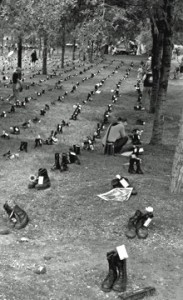 Beloit Poetry Journal
Beloit Poetry Journal
Poet’s Forum
As of June 1, the BPJ site will host a blog. Each month one poet with work in the current issue will post a reflection on that work and invite your questions and comments. The Poet’s Forum poets for the summer issue are:
June 1-30, Erin Malone
July 1-31, Paul Gibbons
August 1-31, John Hodgen
From BPJ: “We hope the forum fosters lively dialogue that strengthens the poetry community the BPJ has contributed to for almost sixty years.” No doubt.
(And might I just say, that IS a lovely zebra you have…)
Reading the World 2008
 4th Annual
4th Annual
Reading the World
June 2008 (and beyond!)
RTW grew out of a series of informal meetings of booksellers and publishers as a way of introducing American readers to more international authors. As Goethe said back in 1827, “Left to itself every literature will exhaust its vitality if it is not refreshed by the interest and contributions of a foreign one.”
This belief that international literature plays a vital role in book culture is one that is shared by all the publishers and booksellers involved in Reading the World. Twenty-five works of literature have been selected to represent a broad range of cultures, from Portugal to Lebanon, from China to Switzerland, from Chile to Japan.
The publishers include: Archipelago; Dalkey Archive; Eccom; Farrar, Straus and Giroux; Houghton Mifflin Harcourt; Knopf; New Directions; New York Review Books; Other Press; Picador; Columbia University; Copper Canyon; Europa; Graywolf; and Grove.
Starting in June, Words Without Borders will be relaunching its Reading the World Book Clubs, featuring reading guides and moderated discussions of several of the RTW titles.
The web site also includes a list of participating bookstores and a bookstore sign-up form.
[Text from the RTW web introduction by: Karl Pohrt, Shaman Drum Bookshop; Chad W. Post, Open Letter/University of Rochester; Jeff Seroy, Farrar, Straus and Giroux.]
Book Review :: Teens and Computers
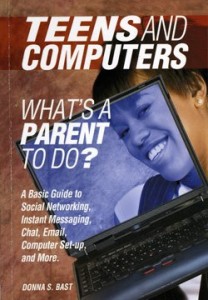 Teens and Computers
Teens and Computers
by Donna S. Bast
2007; 148pp
ISBN 978-1-4196-7075-6
Given my interest in technology and education, I couldn’t resist getting a copy of this book, Teens and Computers: What’s a Parent to Do? A Basic Guide to Social Networking, Instant Messaging, Chat, Email, Computer Set-up and More. I’m a sucker for anything that touts “and more.” Of course, my real agenda in getting this book was to see just how teens were treated. I’ve listened to numerous speakers and read countless efforts by authors to help parents get “in tune” with their teen, and most come off as “us vs. them” masked behind a lot of ageist humor, which only serves to further divide the parent/teen relationship.
Let me further disclaim – I have never raised a teenager. But I work with troubled teens, and I know a lot about what parents do to screw kids up. Donna S. Bast, the author of this book, will not allow that to happen with what she has written here.
Trying to learn hip new technology, I’ve also read several ______ for Dummies books (like for Second Life – I’m STILL not off Welcome Island – Second Life Guantanamo…). The problem with those books: They’re too stupid. Bast’s approach is directed to parents who have some clue about what is out there, and perhaps even use some of the technologies themselves, but don’t quite get how kids use the technologies like oxygen. Bast is able to tap into the realm of how critical these technologies are to teens and their social identities (HUGELY important to teens), and how parents can better work with their teens and technology instead of against both.
The book starts with “What are my Teenagers Doing on the Computer?” and covers IM/Text, chat, blogs, email [old school for teens now!], MySpace, Facebook, Xanga and video portals. Every chapter gives the basics of the technology, its attraction for teens, how new users can access it, what cautions should be heeded, and how to talk with your teen about these concerns.
It’s not until the second part of the book that Bast gets into “Limits for Computer Usage.” But these have been discussed throughout, not so much as taking total control, but how to negotiate responsible usage with your teen. Still, her chapters on “Should I Control…” and “What are the Rules and Consequences…” provide insightful and patiently scripted suggestions. What I think gives Bast the greatest edge in this writing is that she is a computer geek, through and through (her business is Miz Fix-IT Tech). She likes technology and doesn’t want to see it get a bad rap in this parent/teen struggle.
But, the absolute best part of Bast’s book, which I have NEVER seen discussed in any other “how to deal with your teen and technology” forum is the chapter “What Should I Know about Plagiarism and Copyright?” Finally! Thank you Bast! This chapter puts some responsibility on the parents, who are working with their children on homework, to be sure that what their kids write is authentic and not “copy and paste” from the web. She also covers downloading and pirating of music and software. As an educator, this chapter alone (and the appendix on plagiarism) is one I wish every parent of a teen would read and put to use in working with their young scholars.
The rest of the book is devoted to basic computer and Internet education, including computer terms, useful sites, buying a laptop, MORE on plagiarism, and the “dark side” of the Internet. Rather than starting with this material, I like that Bast ends with it. This allows those who need more “basics” to get it, without those who don’t need it feeling as though the book isn’t for them when they open up to the first couple of chapters. Very well planned in terms of delivery of content.
The only drawback to this book that I can see is that it is self-published (available via Amazon and Borders). The double-edged sword. Sure, it’s out there, and I imagine Bast sells them at talks and trainings, but this book would better serve a much wider audience of readers – parents and teachers alike – that could be reached with, say, an academic publisher’s marketing plan. Hello? Scholastic?
Iowa Review Award Winners Announced
 Winners of the 2008 Iowa Review Awards
Winners of the 2008 Iowa Review Awards
May 29, 2008
Nonfiction
First Prize
Nancy Geyer for “Where the Children Are”
Runner-up
Alexis Nelson
Poetry
First Prize
Dave Snyder for “Bamboo Poem”
Runners-up
Mary Austin Speaker, Stephen Gibson
Fiction
First Prize
Andrew Mortazavi for “Stop Six, Ft. Worth”
Runner-up
Jacob M. Appel
New Lit Listings on NewPages
New Sponsor
Superstition Review
Created through an imaginative collaboration between faculty and students in the Writing, Literature and Film program at ASU Polytechnic, the magazine is student edited, student written, and student maintained. Superstition Review is published twice yearly in May and December. Submissions (art, poetry, fiction, nonfiction) read fall (September and October) and spring (February and March).
New Lit Mags Listed
Beeswax
J Journal
Whitefish Review
New Online Mags Listed
LITnIMAGE
Survivor’s Review
Prague Writers’ Festival June 1-5
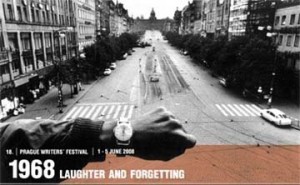 Prague Writers’ Festival 2008
Prague Writers’ Festival 2008
June 1 – 5, 2008
In 2008, the Prague Writers’ Festival celebrates its eighteenth anniversary. The Festival is one of Europe’s leading cultural events, through its unique mix of world-class authors, international media coverage and live broadcasts on the internet. The Festival is co-sponsored by the City of Prague and the Guardian, which presents the Festival through its book pages.
The Festival dates from Keats House, London 1980, when with “Index on Censorship” through the Helsinki Accords we brought vital authors from Central and Eastern Europe to the attention of the public. As Herzen noted: “Fish were born to fly, yet everywhere they swim.” Fortunately in 1991, we could fly east and bring outstanding authors to Prague. In 1997, the Festival became a Czech cultural foundation.
Festival Authors and Moderators
Tariq Ali, Homero Aridjis, Margaret Atwood, Paul Auster, Slavenka Drakulić, Graeme Gibson, Natalia Gorbanevskaya, Jiří Gruša, Siri Hustvedt, Paul Kahn, Ivan Klíma, Petr Král, Günter Kunert, Antonín J. Liehm, Arnošt Lustig, Michael March, Michael McClure, Dimitris Nollas, Jiří Pehe, Igor Pomerantsev, Katerina Anghelaki-Rooke, Elena Schwarz, Ludvík Vaculík, Gary Younge
Bellingham Review Adapts
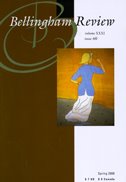 Brenda Miller, Editor of Bellingham Review, writes in issue 60 of recent changes at BR, brought on by a number of factors, not the least of which include the increased costs of both printing and mailing two issues a year. In response to this, BR shows an adaptive turn:
Brenda Miller, Editor of Bellingham Review, writes in issue 60 of recent changes at BR, brought on by a number of factors, not the least of which include the increased costs of both printing and mailing two issues a year. In response to this, BR shows an adaptive turn:
“So, beginning in 2008, the Bellingham Review will experiment with publishing and mailing only one print edition a year (a hefty edition, with same high production values you’ve come to expect), and we will finally overcome our technology phobias and work on making the Bellingham Review website a much more impressive and interactive venue for our readers. We plan to post more of our content online, with special features—such as current book reviews and author interviews—available only in this format…” [read the full letter here]
BR isn’t the first to make this response in the face of hard economic times (or should I say “harder” since the MO of small press endeavors is always hard). As much as we did, will continue, and have every right to grumble and complain about the plight of “small publications,” and fight against rising costs, for those who can respond as BR has, the change can create new avenues. Better? Time will tell, but for now: “You think I’d crumble, you think I’d lay down and die? Oh no, not I. I will survive…”
Awards :: Glimmer Train March Open
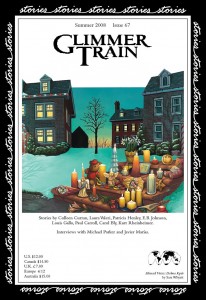 Glimmer Train has chosen the three winning stories of their March Fiction Open competition! This quarterly competition is open to all writers and all themes. Submissions may be sent for the June Fiction Open using the online submissions system at www.glimmertrain.org.
Glimmer Train has chosen the three winning stories of their March Fiction Open competition! This quarterly competition is open to all writers and all themes. Submissions may be sent for the June Fiction Open using the online submissions system at www.glimmertrain.org.
First place: Frederick Reiken of Shutesbury, Massachusetts, wins $2000 for “Shadow”. His story will be published in the Winter 2009 issue of Glimmer Train Stories.
Second place: Yelizaveta Renfro of Sidney, Nebraska, wins $1000 for “Splendid, Silent Sun”. Her story will also be published in an upcoming issue of Glimmer Train Stories.
Third place: Emma Roper-Evans of London, England, wins $600 for “Rice Dish”. Her story will also be published in an upcoming issue of Glimmer Train Stories, increasing her prize to $700.
NewPages on Facebook
Thanks to Book Review Editor Matt Bell, NewPages once again has a presence on Facebook. Stop on by and become a Fan of NewPages! Updates include book reviews, lit mag reviews, submissions, and more – including the coolness factor of having yet another Facebook Friend!
E-Lit Conference Call for Papers 6.20
Call for Papers and Works
Seminar on Electronic Literature in Europe
University of Bergen in Bergen, Norway
September 11-13th, 2008
The Fall 2008 Bergen Seminar on Electronic Literature in Europe will build upon the work of the e-poetry seminar held in Paris in February 2008 at the University Paris 8, the 2007 e-poetry conference in Paris, the 2007 Remediating Literature Conference in Utrecht, and other recent activity in the field of electronic literature in Europe. Deadline for proposals June 20.
[Posted on jill/txt blog.]
Jobs :: Various
The Fine Arts Center of the School District of Greenville, South Carolina seeks a Director of Creative Writing. Betty Gerow.
The University of Pittsburgh at Johnstown Program in Creative & Professional Writing seeks visiting assistant professor/instructor for academic year 2008-2009; one-year appointment, potential for yearly renewal. Frances Zauhar, Chair, Humanities Division. June 1, 2008.
New Site Launch :: The New Criterion
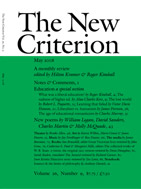
“The New Criterion, now co-edited by the art critic Hilton Kramer and Roger Kimball, was founded in 1982 by Mr. Kramer and the pianist and music critic Samuel Lipman. A monthly review of the arts and intellectual life . . . Serious, but not academic . . . a staunch defender of the values of high culture, an articulate scourge of artistic mediocrity and intellectual mendacity wherever they are found. . .”
The May 2008 issue includes a special feature on eduction, with online content providing limtied content access (subscribers have full access). The following
Articles
Introduction: What was a Liberal education? by Roger Kimball
An introduction to our special issue on education.
The New Learning that Failed by Victor Davis Hanson
On the value of classical learning.
The Age of Educational Romanticism by Charles Murray
On requiring every child to be above average.
Poems
The Old Story by William Logan
The Fossil-Finder by David Sanders
Some Kind of Happiness by Charles Martin
The Other Osprey by Molly McQuade
Art
Gallery Chronicle by James Panero
On “John Dubrow: Paintings” at Lori Bookstein Fine Art, “Wayne Thiebaud: The Figure” at Allan Stone Gallery, “Gregory Crewdson” at Luhring Augustine, and “Lois Dodd: Landscapes and Structures, a Survey Exhibition” at Alexandre Gallery.
In Memoriam :: Nuala O’Faolain
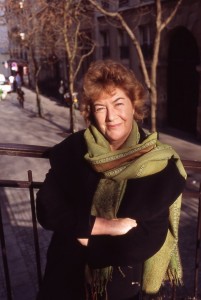 In catching up on my RSS feeds, I just now learned of the passing of Nuala O’Faolain. I am saddened to hear of this loss to us all, most especially those closest to her. I only learned of her work a few years ago while listening to the Diane Rehm show on NPR. I was absolutely fascinated with O’Faolain’s discussion of her memoir, Almost There: The Onward Journey of a Dublin Woman. As can happen with Rehm’s interviews, their discussion went off onto many other topics, including O’Faolain’s views on relationships and her lack of belief in any kind of afterlife. Her candid assuredness and openess in discussing these topic with Rehm led me to go out and gather as much of her writing as I could find. My respect of her grew through these as well as her staunch journalism work; and of her decision to travel during her last months of life, I find it in keeping with the fortitude of her character I will forever admire.
In catching up on my RSS feeds, I just now learned of the passing of Nuala O’Faolain. I am saddened to hear of this loss to us all, most especially those closest to her. I only learned of her work a few years ago while listening to the Diane Rehm show on NPR. I was absolutely fascinated with O’Faolain’s discussion of her memoir, Almost There: The Onward Journey of a Dublin Woman. As can happen with Rehm’s interviews, their discussion went off onto many other topics, including O’Faolain’s views on relationships and her lack of belief in any kind of afterlife. Her candid assuredness and openess in discussing these topic with Rehm led me to go out and gather as much of her writing as I could find. My respect of her grew through these as well as her staunch journalism work; and of her decision to travel during her last months of life, I find it in keeping with the fortitude of her character I will forever admire.
Nuala O’Faolain, 68; Irish journalist, wrote memoir ‘Are You Somebody?’
By Mary Rourke, Los Angeles Times Staff Writer
May 19, 2008
Nuala O’Faolain, the Irish journalist and author whose 1996 memoir, “Are You Somebody?,” captured international attention for its soul-searching candor, died May 9 in a Dublin hospice of complications from lung cancer, according to news reports from Ireland. She was 68.
O’Faolain, a resident of Barrtra in County Clare, Ireland, with homes in Dublin and New York City, recently announced that she had inoperable lung cancer and she had turned down the option of chemotherapy, choosing instead to travel in Europe until she had to be hospitalized.
She wrote about everyday events in a way that touched on basic human realities. For one column she visited the intensive care unit of a maternity ward where the fragile newborns didn’t cry. They couldn’t, she wrote, because they were sedated.
She often covered political and social issues from her outspoken, feminist perspective. In general, however, she was known to be unpredictable in her views, with a gentle sense of humor.
O’Faolain’s bestselling memoir began as an idea for a book-length collection of her columns. She started writing an introduction that grew into several hundred pages of intensely personal autobiography. The memoir’s subtitle, “The Accidental Memoir of a Dublin Woman,” suggests the change in direction.
“I had to answer the question nobody had asked: Where do my opinions come from?” O’Faolain said of her purpose for writing a memoir, in a 2001 New York Times interview. “The answer was simple. Ideology had nothing to do with it. My opinions come from my life.”
[Read the rest on LA Times.]
Book Contests Updated
I’ve been working away at the book contests page. Those listed are sponsored by publications, publishers and universities listed elsewhere on the NewPages site. If you have a contest that is not listed, please let me know by sending a weblink to: denisehill-at-newpages.com.
New Lit on the WebBlock :: 5th Gear
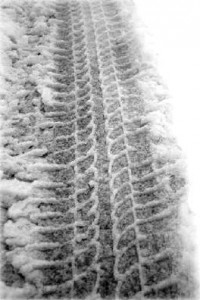 Originally published in print from October 1993-April 2002 by Andy Fogle with the help of Chris Saywer (author of the zine Ingin the Ooh), 5th Gear dedicated itself to publishing a variety of poetic forms. When Saywer moved, the magazine took a hit in production quality and Fogle hung it up for four years. Now it’s back with the help of Adam Parez and Mark Fitzgerald.
Originally published in print from October 1993-April 2002 by Andy Fogle with the help of Chris Saywer (author of the zine Ingin the Ooh), 5th Gear dedicated itself to publishing a variety of poetic forms. When Saywer moved, the magazine took a hit in production quality and Fogle hung it up for four years. Now it’s back with the help of Adam Parez and Mark Fitzgerald.
The publication now runs five-poem monthly installments. Fogle notes on the site that they started in January, but only March and April are currently archived online. “In this new format, in addition to poetry, we envision publishing reviews, essays, fiction, and artwork. However, at present, we are only accepting unsolicited poetry; for now, submissions for all other genres are by invitation only.”
Although the publication is online, only paper submissions are accepted. The upshot is the response: “We reply in 3-12 weeks, and comment fairly often; if we like your work, don’t be surprised if that commentary is pretty detailed/specific.”
Additionally, Fogle puts this call out on the site: “I’d also like to reach out to any poets previously published in 5th Gear and old MFA pals. If you have fond memories (or even just decent ones; I fear there are also a few nightmares) of this magazine, just drop me a line at the Schenectady box; I’d love to see your work again.”
For more information, swing by 5th Gear.
Awards :: PEN American Center
The 2008 PEN Literary Awards recipients were determined by distinguished panels of judges, all of whom are writers, editors, translators, poets, or playwrights themselves. This year’s program will see the conferral of a new award: the PEN/Jacqueline Bograd Weld Award for Biography.
PEN/Nabokov Award ($20,000)
To Cynthia Ozick
PEN/Robert Bingham Fellowship for Writers ($35,000)
To Dalia Sofer
PEN/Jacqueline Bograd Weld Award for Biography ($10,000)
To Janet Malcolm for Two Lives: Gertrude and Alice
Pels Foundation Awards for Drama ($7,500)
To Richard Nelson and Sarah Ruhl
PEN/Phyllis Naylor Working Writer Fellowship ($5,000)
To Theresa Nelson for Julia Delany: The American Version
PEN/Voelcker Award for Poetry ($5,000)
To Kimiko Hahn
PEN Award for Poetry in Translation ($3,000)
To Rosmarie Waldrop for Lingos I-IX
PEN Translation Prize ($3,000)
To Margaret Jull Costa for The Maias
NewPages Book Reviews :: Matt Bell Takes the Helm
 Matt Bell reads (a lot). Matt Bell writes (a lot). Matt Bell drinks beer (no comment – but we’ll take donations for Matt as well). This was enough to get Matt Bell started writing reviews with NewPages a year or so ago. But this wasn’t enough for Matt. He wanted more, and as we weren’t the least bit abashed in taking advantage of that energy, crowned him Book Review Editor.
Matt Bell reads (a lot). Matt Bell writes (a lot). Matt Bell drinks beer (no comment – but we’ll take donations for Matt as well). This was enough to get Matt Bell started writing reviews with NewPages a year or so ago. But this wasn’t enough for Matt. He wanted more, and as we weren’t the least bit abashed in taking advantage of that energy, crowned him Book Review Editor.
As editor, Matt is large and in charge of the section: recruiting and screening prospective reviewers, managing content, and reading for first edit. He does this in addition to keeping up with his own writing, having published numerous short stories and now working on his first novel, as well as maintaining a bill-paying job and a personal life in there somewhere that includes his wife, Jessica.
I don’t know how he does it, but given the immediate ramp-up of the book reviews, and the positive feedback we’ve received thus far, it is definitely working. I asked Matt to explain what he sees as the role of book reviews for NewPages readers, and his role as a reviewer as well as editor:
“When I write my own reviews, my goals are to promote good writing, to explain why I think a book is worth the reader’s time, and to dive in critically to try and expose some of what makes the book work. In editing other people’s reviews, the goals are similar: I want to bring out the strengths in each reviewer’s own style and to help them write as strongly and as clearly as possible.
“Overall, I want the NewPages book review section to be a place that is unapologetically enthusiastic about books, especially the great work coming out of the smaller presses. Every day I read news stories about declining readerships, the death of the short story, the relegation of poetry to academia, and I can’t help but disagree. I think this is a great time to be a reader. There are so many good writers out there, and it’s our job to keep giving those people the critical attention their work deserves.
“I truly believe that fiction in general and the short story in particular is in as good a shape today as it has ever been. Perhaps its commercial potential has diminished, but its artistic potential is off the charts. I’m less personally knowledgeable about the state of poetry, but I think excellent writing is being done there as well, at least judging from some of the reviews we’ve published lately and the enthusiasm of those reviewers.”
Matt Bell lives in Ann Arbor, MI. His fiction has appeared in magazines such as Barrelhouse, Juked, Caketrain, and McSweeney’s Internet Tendency, and is upcoming in No Colony and Hobart. He can be found online at www.mdbell.com.
If you are a reader/writer interested in reviewing for NewPages, contact Matt Bell (newpages.matt-at-gmail.com) for book reviews and/or Denise Hill (denisehill-at-newpages.com) for literary magazine reviews.
If you want to know about having your book or lit mag reviewed on NewPages, please see our FAQ page.
The “Obscure” Summer Reading List
Posted last week on the Village Voice, this article includes a list of famous writers’ favorite obscure books, each with a brief comment. Check out a few mentions here:
Our Favorite Writers Pick Their Favorite Obscure Books
by Alexander Nazaryan
From the Village Voice Summer Guide
May 13th, 2008
Jennifer Egan
You Can’t Live Forever, by Harold Q. Masur
John Banville
Some People, by Harold Nicolson
Donna Tartt
Blood in the Parlor, by Dorothy Dunbar
Rick Moody
Frank Zappa: The Negative Dialectics of Poodle Play, by Ben Watson
Jonathan Ames
The Lunatic at Large, by J. Storer Clouston
Read the rest of the list complete with comments on Village Voice online.
Lit Radio :: Bibliocracy
 Bibliocracy Radio is hosted by Santa Monica Review editor Andrew Tonkovich, Bibliocracy is a weekly literary arts program featuring readings and discussions with writers. Recent guests include: Al Young, Judith Freeman, Daniel Olivas, Reyna Grande, Michael Jaime-Becerra, Toni Mirosevich, Terese Svoboda, Katha Pollitt, Diane Lefer.
Bibliocracy Radio is hosted by Santa Monica Review editor Andrew Tonkovich, Bibliocracy is a weekly literary arts program featuring readings and discussions with writers. Recent guests include: Al Young, Judith Freeman, Daniel Olivas, Reyna Grande, Michael Jaime-Becerra, Toni Mirosevich, Terese Svoboda, Katha Pollitt, Diane Lefer.
John Lithgow + Cheerios = Books
 First Book has teamed up with Cheerios and John Lithgow to present this year’s Cheerios Book Donation Challenge, which gives readers the chance to determine where Cheerios will donate 100,000 new books by Lithgow to children across the country. For every question answered correctly, readers can vote for the state they’d like to receive new books for children in need. The top 5 vote-getting states will each receive 20,000 new books for local children! Votes can be cast from now until Sunday, June 15!
First Book has teamed up with Cheerios and John Lithgow to present this year’s Cheerios Book Donation Challenge, which gives readers the chance to determine where Cheerios will donate 100,000 new books by Lithgow to children across the country. For every question answered correctly, readers can vote for the state they’d like to receive new books for children in need. The top 5 vote-getting states will each receive 20,000 new books for local children! Votes can be cast from now until Sunday, June 15!
I tried the “quiz” – questions are taken from books promoted through Cheerios Spoonfuls of Stories program (with Simon & Schuster). For each question I got correct, I was able to pick which state I wanted to receive the books. I went through about 15 questions and, not having read the books, got 11 questions correct. It would be good encouragement for kids to have them read at least some of the books in advance and see if they could answer the questions for those books. I don’t know if there’s a cap on the number of questions – but wrong answers don’t stop you from continuing.
Organizations that want to be considered to receive free books can sign up on the First Book website.
Georgia Review Receives Awards
 The University of Georgia’s Georgia Review Wins General Excellence Award and Six Others in 2008 GAMMA Awards Competition
The University of Georgia’s Georgia Review Wins General Excellence Award and Six Others in 2008 GAMMA Awards Competition
The Georgia Review, the University of Georgia’s nationally renowned quarterly journal of arts and letters, earned seven honors, including four golds, at the Magazine Association of the Southeast’s 2008 GAMMA Awards. Chief among the wins was the General Excellence award for publications with less than one million dollars in revenue.
Other gold awards for UGA’s standout publication were as follows: Best Feature, for “‘The Commerce Between Us’: Correspondence from the Archives, 1977-2000 (Spring 2007 issue); Best Profile, for “Annabel Before the War: Only What I See” by Joy Passanante (Summer 2007); and Best Photography, for “3-D” by Thomas Allen (Spring 2007). “Pursuing the Great Bad Novelist” (Fall 2007), the first-ever publication by Laura Sewell Matter, earned a silver award in the Essays category.
Read the full press release here.
Bard Fiction Prize 6.15
The Bard Fiction Prize is awarded annually to a promising, emerging writer who is an American citizen aged 39 years or younger at the time of application.
In addition to the monetary award, the winner receives an appointment as writer-in-residence at Bard College for one semester without the expectation that he or she teach traditional courses. The recipient will give at least one public lecture and will meet informally with students.
Deadline July 15, 2008
More info here: Bard College Fiction Prize
Residency :: Lake Forest College 5.15
The Madeleine P. Plonsker Emerging Writer’s Residency Prize
Lake Forest College, in conjunction with the &NOW Festival, invites applications for an emerging poet under forty years old, with no major book publication to spend two months (February-March or March-April 2009) in residence at our campus in Chicago’s northern suburbs on the shore of Lake Michigan. There are no formal teaching duties attached to the residency. Time is to be spent completing a manuscript, participating in the Lake Forest Literary Festival, and offering two public presentations.
The completed manuscript will be published (upon approval) by the new Lake Forest College Press &NOW Books imprint. The stipend is $10,000, with a housing suite and campus meals provided by the college.
Send curriculum vita, manuscript in progress, and a statement of plans for the completion of the manuscript to Plonsker Residency, Department of English, Lake Forest College, Box A16, 555 N. Sheridan Road, Lake Forest, IL 60045. Review of manuscripts by judges Robert Archambeau, Davis Schneiderman, and Joshua Corey will begin May 15, 2008 and continue until the position is filled.
Comments on the Absinthe Festival
 The Absinthe Festival of New European Film and Writing hosted by Oakland University, Friday May 9-10 was a great cultural getaway. Close to home, we made a mini-vacation of it and caught Eamonn Wall and Valzhyna Mort reading on Friday night.
The Absinthe Festival of New European Film and Writing hosted by Oakland University, Friday May 9-10 was a great cultural getaway. Close to home, we made a mini-vacation of it and caught Eamonn Wall and Valzhyna Mort reading on Friday night.
I’ve not heard of Eamonn Wall before, and I am grateful for the introduction to his works. Combined with strong, rooted imagery, a number of his works read like stories and were easy to follow for an oral reading, but I kept feeling that I wanted to go right back and read to myself what I had just heard in order to more fully absorb it. Refuge at DeSoto Bend, his newest collection published by Salmon Press, includes a section of poems on the Wexford Container Tragedy, a piece of history from 2001 I vaguely recalled – thirteen immigrants seeking asylum found in a crate that was misrouted before being brought to Wexford, Ireland. Eight of them had died. Eamonn’s treatment of this tragedy creates a historical retelling as well as emotional reliving of the event, but also attempts some sense of respectful remembrance.
Valzhyna Mort followed, and began in dramatic fashion by reading the first poem of her collection Factory of Tears (Copper Canyon Press) in Belarusian, then in English. She remarked on the nature of translation, that, because of cultural differences, “some things you just never get,” but how she also enjoyed translation “so much better than writing.” She continued reading from her collection, interspersed with commentary about her work. She remarked on some poems and their interpretations. For example, the poem “Men” readers often think is a love poem. “It’s not,” Mort clarified. “It’s a hate poem.”
In an interesting discussion of “A Poem About White Apples,” Mort reflected on the nature of translation by telling about one of her readings when she spoke with the sign interpreter. Before reading the poem, Mort explains that white apples are a common fruit in her native country, and that the poem is a reflection on that first moment when she truly felt displaced. How she craved the taste and texture of this specific fruit that could not be found in the U.S. At that previous reading, the sign interpreter had thanked her for this explanation, because having read the poem, he was going to interpret the apples as “breasts.” Mort said, “It’s just about apples.” I and others in the audience laughed at this story, but were brought up abruptly when she said, “And it’s a sad poem.” Then read on.
Much of her reading is this way; as you might think to relax and feel warmth in any moment, it is suddenly pulled up short, and the language – heavily metaphoric and imagistic – in her creations have a repeated pummeling effect on your core. It reminded me of how a little cartoon hero might seem so unassuming visually, but in punching its opponent, sends the villain flying through the air to smash through several brick walls, leaving the outline of the helpless body. Poem after poem, line after line of her work caught me, threw me, held me up against that wall before letting me drop down. It is exhausting poetry to read/hear, but of such allure that once is never enough. I bought her book so I could experience these feelings again and again.
It was curious that she mentioned several times that this or that poem might be “lighter” than the others, and read one saying that it would be a funny poem. She seemed almost apologetic that her poems did not bring laughter to the audience. Do we expect poets to make us laugh? I wondered. I have quickly come not to expect that from her poems, and am grateful for what they do deliver in terms of my responses to them. I don’t need to be made to laugh. Other emotional responses are just as important for me as a reader, and often times much more lasting.
Saturday brought the German film Yella , the Romanian film How I Spent the End of the World, both of which I would recommend to viewers, and a reading by Polish poet Piotr Sommer. Sommer’s works were a contrast to the previous evening’s readings. His works are short, almost hard to listen to because they go so quickly and were so condensed in their language and imagery. Several times, I wanted to say, “Would you read that one again?” but not because I wasn’t listening. I just needed a second chance to take it all in.
A Q&A followed his reading, and I asked, “What do you think is lost in translation and what do you think is gained in translation?” His being not only a writer whose works are translated, but a translator himself, he seemed to first beg off the question by saying, “I’m not good at aphorisms.” Confessing it would be easier to look at specific examples to make more direct analysis, he did offer the generalized observation that if it is a good poem, well written, that for the purpose of translations, nothing really will be lost, and that which is may not be that important to the culture of the language into which it is translated. He went on with some raised interest to speak of how much can be gained in the translation, how translated works can become something new of their own. Not necessarily completely different from the original piece, but each working on its own plane, parallel to one another.
There were more events at the festival, including a reading by translators Doris Runey, Marilynn Rashid, and Keith Taylor, a screening of the Russian film The Island, and numerous short films by Oakland University students. Unfortunately, we were not able to take in all the festival had to offer, but with such a strong start, I hope that Absinthe is able to offer this opportunity again next year. Kudos to Dwyane D. Hayes, Jessica Bomarito and all the Absinthe and UO folks who made this a very well organized and memorable event.
Art :: Wheelchair = Paintbrush
 Tommy Hollenstein: Tracking Art
Tommy Hollenstein: Tracking Art
By Sam Maddox
New Mobility, April 2008
“Tommy Hollenstein’s artwork is colorful and chaotic yet infused with the optimism and transformative drama that define the Southern California experience. Tommy is a native Angelino ex-surfer boy who sports a mini-Mohawk bleach job and a tanned and mellow Valley boy manner. He’s been getting lots of traction, so to speak, with his work. He paints by joystick — that is, with the tires of his power wheelchair — rolling through paint spilled on the floor, or with a dab of color coated on the tires to layer colors toward a unique, complex whole. He calls it a sort of ‘action painting.'”
Read the rest and see several more images of Hollenstein and his art on New Mobility.
